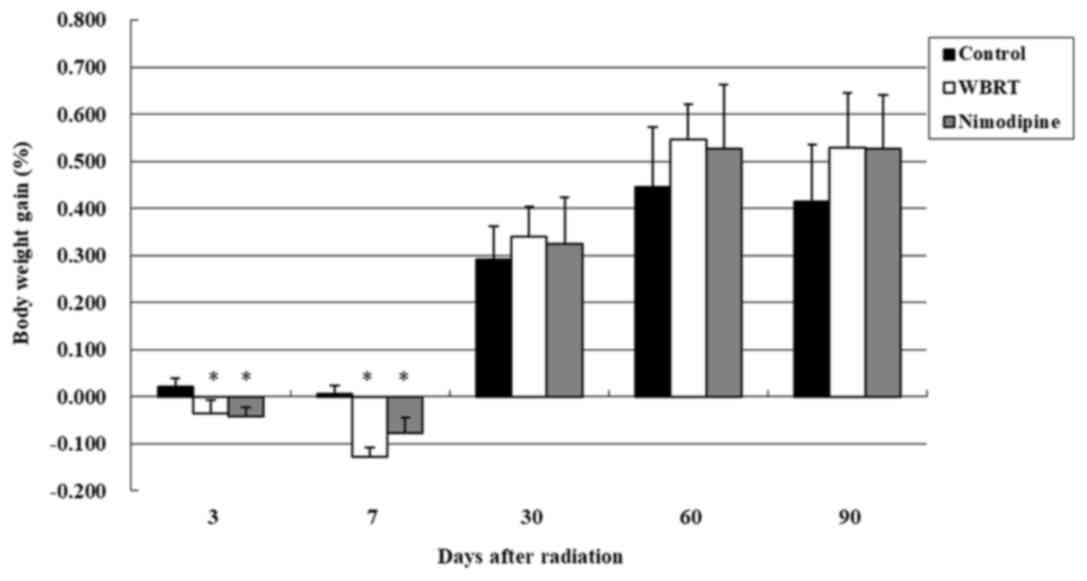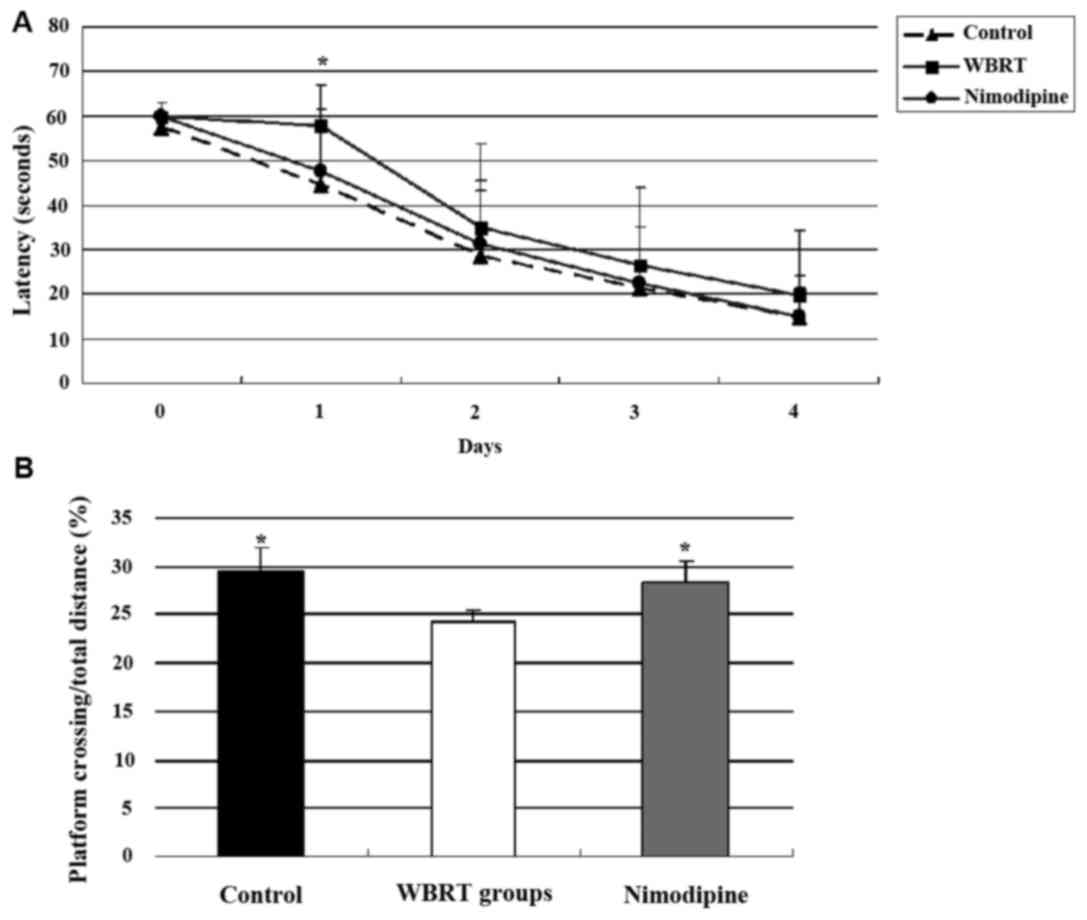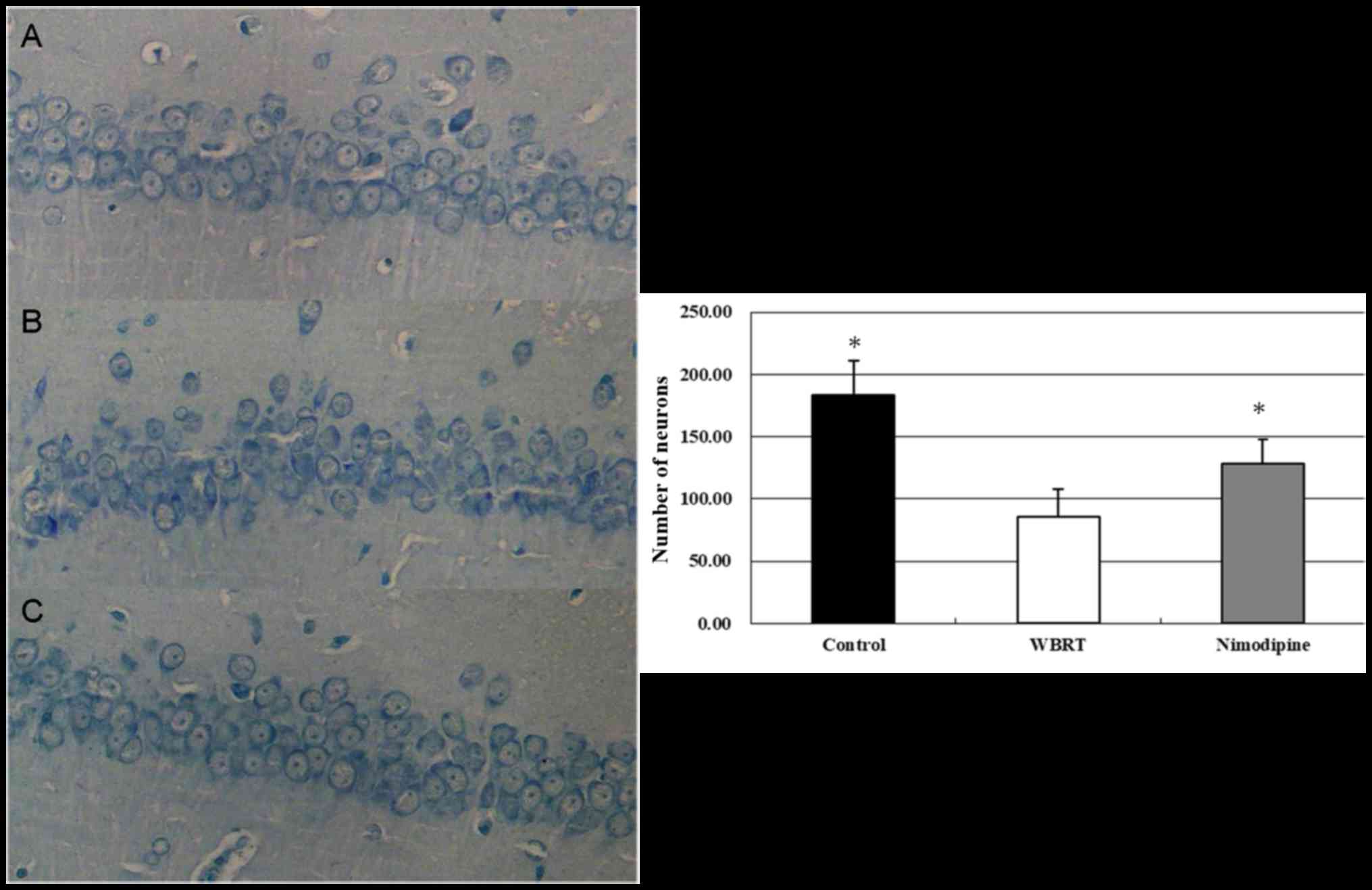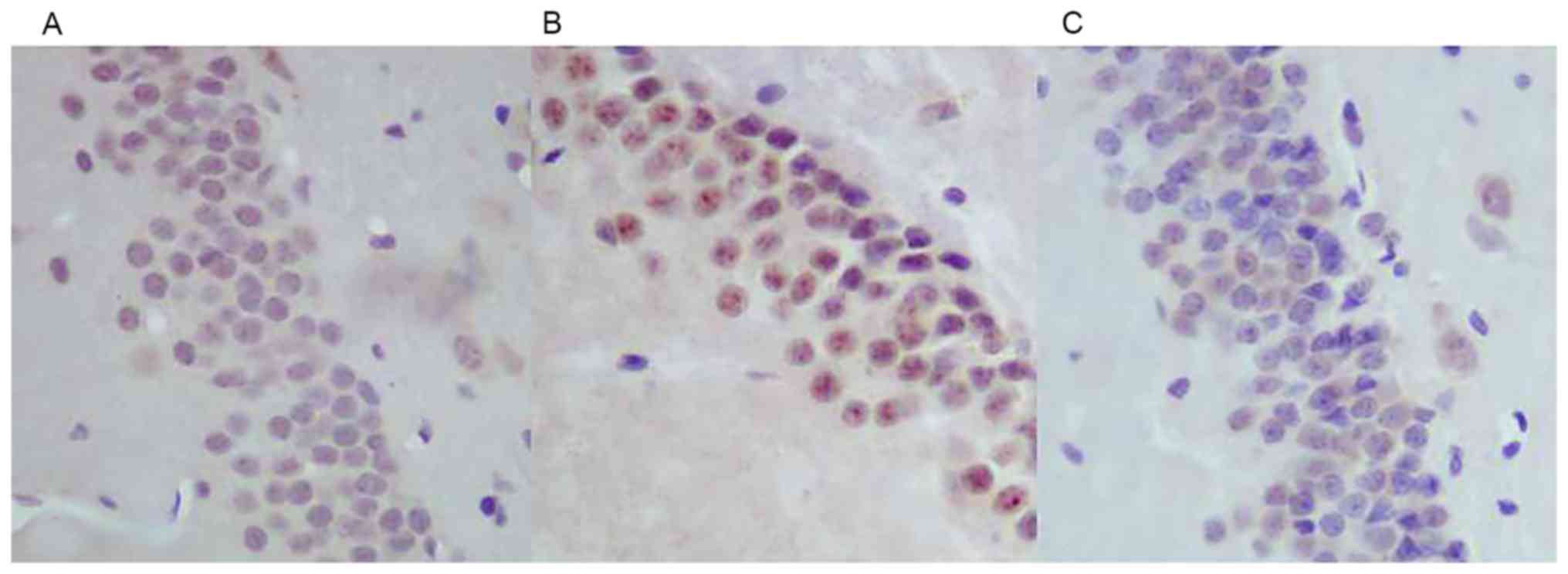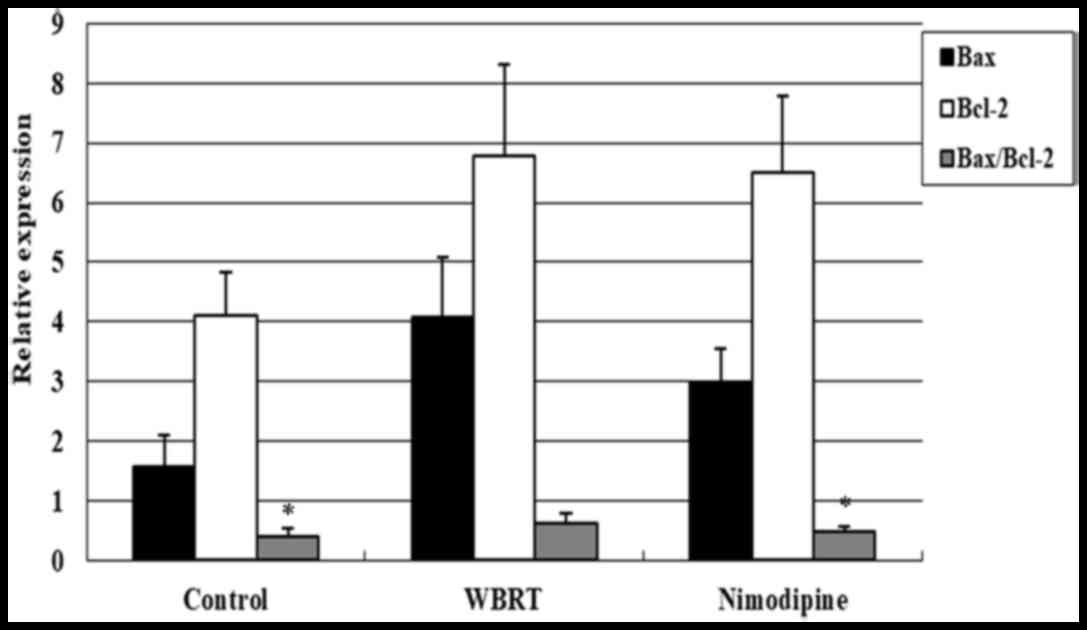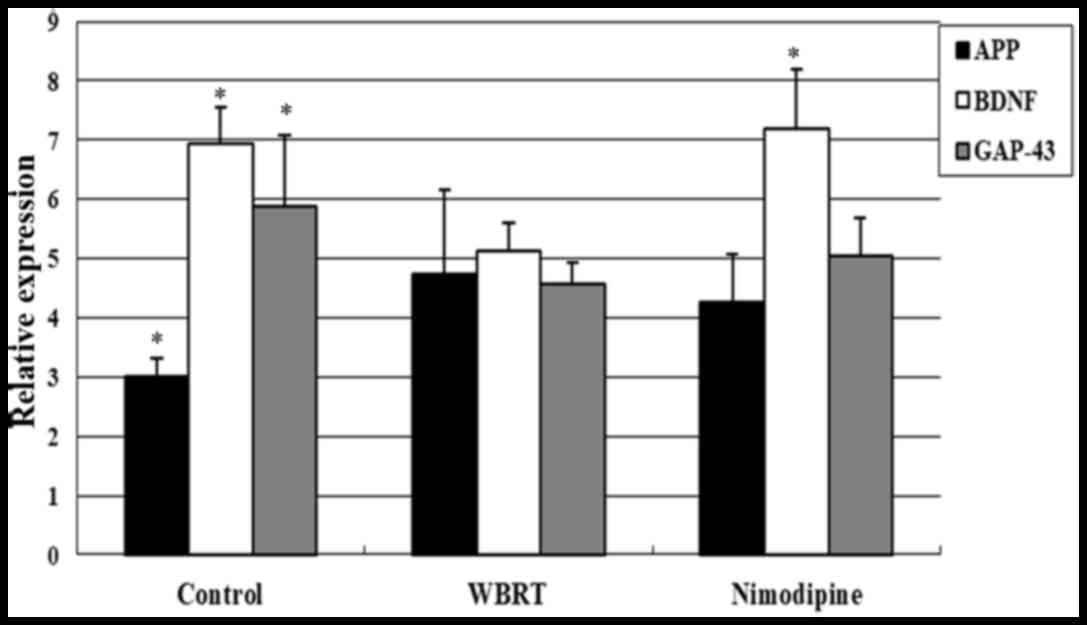|
1
|
Surma-aho O, Niemelä M, Vilkki J, Kouri M,
Brander A, Salonen O, Paetau A, Kallio M, Pyykkönen J and
Jääskeläinen J: Adverse long-term effects of brain radiotherapy in
adult low-grade glioma patients. Neurology. 56:1285–1290. 2001.
View Article : Google Scholar : PubMed/NCBI
|
|
2
|
Blomstrand M, Brodin NP, Munck Af
Rosenschöld P, Vogelius IR, Merino SHnchez G, Kiil-Berthlesen A,
Blomgren K, Lannering B, Bentzen SM and Björk-Eriksson T: Estimated
clinical benefit of protecting neurogenesis in the developing brain
during radiation therapy for pediatric medulloblastoma. Neuro
Oncol. 14:882–889. 2012. View Article : Google Scholar : PubMed/NCBI
|
|
3
|
Greene-Schloesser D, Moore E and Robbins
ME: Molecular pathways: Radiation-induced cognitive impairment.
Clin Cancer Res. 19:2294–2300. 2013. View Article : Google Scholar : PubMed/NCBI
|
|
4
|
Sano K, Morii K, Sato M, Mori H and Tanaka
R: Radiation-induced apoptosis and injury of oligodendrocytes on
neonatal rat brains. Neurol Med Chir (Tokyo). 40:495–500. 2000.
View Article : Google Scholar : PubMed/NCBI
|
|
5
|
Naylor AS, Bull C, Nilsson MK, Zhu C,
Björk-Eriksson T, Eriksson PS, Blomgren K and Kuhn HG: Voluntary
running rescues adult hippocampal neurogenesis after irradiation of
the young mouse brain. Proc Natl Acad Sci USA. 105:14632–14637.
2008. View Article : Google Scholar : PubMed/NCBI
|
|
6
|
Balentova S and Adamkov M: Molecular,
cellular and functional effects of radiation-induced brain injury:
A review. Int J Mol Sci. 16:27796–27815. 2015. View Article : Google Scholar : PubMed/NCBI
|
|
7
|
Brown WR, Blair RM, Moody DM, Thore CR,
Ahmed S, Robbins ME and Wheeler KT: Capillary loss precedes the
cognitive impairment induced by fractionated whole-brain
irradiation: A potential rat model of vascular dementia. J Neurol
Sci. 257:67–71. 2007. View Article : Google Scholar : PubMed/NCBI
|
|
8
|
Jenrow KA, Brown SL, Lapanowski K, Naei H,
Kolozsvary A and Kim JH: Selective inhibition of microglia-mediated
neuroinflammation mitigates radiation-induced cognitive impairment.
Radiat Res. 179:549–556. 2013. View
Article : Google Scholar : PubMed/NCBI
|
|
9
|
Huo K, Sun Y, Li H, Du X, Wang X, Karlsson
N, Zhu C and Blomgren K: Lithium reduced neural progenitor
apoptosis in the hippocampus and ameliorated functional deficits
after irradiation to the immature mouse brain. Mol Cell Neurosci.
51:32–42. 2012. View Article : Google Scholar : PubMed/NCBI
|
|
10
|
Vosler PS, Brennan CS and Chen J:
Calpain-mediated signaling mechanisms in neuronal injury and
neurodegeneration. Mol Neurobiol. 38:78–100. 2008. View Article : Google Scholar : PubMed/NCBI
|
|
11
|
Nazırog˘lu M, Senol N, Ghazizadeh V and
Yürüker V: Neuroprotection induced by N-acetylcysteine and selenium
against traumatic brain injury-induced apoptosis and calcium entry
in hippocampus of rat. Cell Mol Neurobiol. 34:895–903. 2014.
View Article : Google Scholar : PubMed/NCBI
|
|
12
|
Choi SK, Lee GJ, Choi S, Kim YJ, Park HK
and Park BJ: Neuroprotective effects by nimodipine treatment in the
experimental global ischemic rat model: Real time estimation of
glutamate. J Korean Neurosurg Soc. 49:1–7. 2011. View Article : Google Scholar : PubMed/NCBI
|
|
13
|
Bullock R, Zauner A, Woodward J and Young
HF: Massive persistent release of excitatory amino acids following
human occlusive stroke. Stroke. 26:2187–2189. 1995. View Article : Google Scholar : PubMed/NCBI
|
|
14
|
Hu HH, Li SJ, Wang P, Yan HC, Cao X, Hou
FQ, Fang YY, Zhu XH and Gao TM: An L-Type Calcium Channel Agonist,
Bay K8644, Extends the Window of intervention against ischemic
neuronal injury. Mol Neurobiol. 47:280–289. 2013. View Article : Google Scholar : PubMed/NCBI
|
|
15
|
Chen Y, Sun AM, Chen ZX, Liu Y, Chen LH
and Yuan YW: Ginsenoside Rg1 protects rat hippocampal neurons from
radiation injury by regulating NOS activity. Nan Fang Yi Ke Da Xue
Xue Bao. 30:1522–1555. 2010.(In Chinese). PubMed/NCBI
|
|
16
|
Zhang DS, Liu YL, Zhu DQ, Huang XJ and Luo
CH: Point application with Angong Niuhuang sticker protects
hippocampal and cortical neurons in rats with cerebral ischemia.
Neural Regen Res. 10:286–291. 2015. View Article : Google Scholar : PubMed/NCBI
|
|
17
|
Livak KJ and Schmittgen TD: Analysis of
relative gene expression data using real-time quantitative PCR and
the 2(-Delta Delta C(T)) method. Methods. 25:402–408. 2001.
View Article : Google Scholar : PubMed/NCBI
|
|
18
|
Bekinschtein P, Kent BA, Oomen CA,
Clemenson GD, Gage FH, Saksida LM and Bussey TJ: Brain-derived
neurotrophic factor interacts with adult-born immature cells in the
dentate gyrus during consolidation of overlapping memories.
Hippocampus Aug. 24:905–911. 2014. View Article : Google Scholar
|
|
19
|
Jeon YK and Ha CH: The effect of exercise
intensity on brain derived neurotrophic factor and memory in
adolescents. Environ Health Prev Med. 22:272017. View Article : Google Scholar : PubMed/NCBI
|
|
20
|
Holahan MR: A shift from a pivotal to
supporting role for the growth-associated protein (GAP-43) in the
coordination of axonal structural and functional plasticity. Front
Cell Neurosci. 11:2662017. View Article : Google Scholar : PubMed/NCBI
|
|
21
|
Preat T and Goguel V: Role of drosophila
amyloid precursor protein in memory formation. PLoS One.
12:1422016.
|
|
22
|
Ganau L, Paris M, Ligarotti GK and Ganau
M: Management of gliomas: Overview of the latest technological
advancements and related behavioral drawbacks. Behav Neurol.
2015:8626342015. View Article : Google Scholar : PubMed/NCBI
|
|
23
|
Brown PD, Jaeckle K, Ballman KV, Farace E,
Cerhan JH, Anderson SK, Carrero XW, Barker FG II, Deming R, Burri
SH, et al: Effect of radiosurgery alone vs radiosurgery with whole
brain radiation therapy on cognitive function in patients with 1 to
3 brain metastases: A randomized clinical trial. JAMA. 316:401–409.
2016. View Article : Google Scholar : PubMed/NCBI
|
|
24
|
Shi L, Adams MM, Long A, Carter CC,
Bennett C, Sonntag WE, Nicolle MM, Robbins M, D'Agostino R and
Brunso-Bechtold JK: Spatial learning and memory deficits after
whole-brain irradiation are associated with changes in NMDA
receptor subunits in the hippocampus. Radiat Res. 166:892–899.
2006. View
Article : Google Scholar : PubMed/NCBI
|
|
25
|
Semmler A, Garbe S, Moskau S, Frisch C,
Eter N, Schlegel U and Linnebank M: An efficient method for
fractionated whole rodent brain radiation. Neurol Res. 35:355–359.
2013. View Article : Google Scholar : PubMed/NCBI
|
|
26
|
Xu M, Fan Q, Zhang J, Chen Y, Xu R, Chen
L, Zhao P and Tian Y: NFAT3/c4-mediated excitotoxicity in
hippocampal apoptosis during radiation-induced brain injury. J
Radiat Res. 58:827–833. 2017. View Article : Google Scholar : PubMed/NCBI
|
|
27
|
Li YQ, Cheng Z and Wong S: Differential
apoptosis radiosensitivity of neural progenitors in adult mouse
hippocampus. Int J Mol Sci. 17:E972016.PubMed/NCBI
|
|
28
|
Tada E, Parent JM, Lowenstein DH and Fike
JR: X-irradiation causes a prolonged reduction in cell
proliferation in the dentate gyrus of adult rats. Neuroscience.
99:33–41. 2000. View Article : Google Scholar : PubMed/NCBI
|
|
29
|
Hassan HA, Hafez HS and Goda MS: Mentha
piperita as a pivotal neuro-protective agent against gamma
irradiation induced DNA fragmentation and apoptosis: Mentha extract
as a neuroprotective against gamma irradiation. Cytotechnology.
65:145–156. 2013. View Article : Google Scholar : PubMed/NCBI
|
|
30
|
Zhang Y, Cheng Z, Wang C, Ma H, Meng W and
Zhao Q: Neuroprotective effects of kukoamine a against
radiation-induced rat brain injury through inhibition of oxidative
stress and neuronal apoptosis. Neurochem Res. 41:2549–2558. 2016.
View Article : Google Scholar : PubMed/NCBI
|
|
31
|
Derdikman D and Moser EI: A manifold of
spatial maps in the brain. Trends Cogn Sci. 14:561–569. 2010.
View Article : Google Scholar : PubMed/NCBI
|
|
32
|
Preston AR and Eichenbaum H: Interplay of
hippocampus and prefrontal cortex in memory. Curr Biol.
23:R764–R773. 2013. View Article : Google Scholar : PubMed/NCBI
|
|
33
|
Monje ML and Palmer T: Radiation injury
and neurogenesis. Curr Opin Neurol. 16:129–134. 2003. View Article : Google Scholar : PubMed/NCBI
|
|
34
|
Hamani C, Stone SS, Garten A, Lozano AM
and Winocur G: Memory rescue and enhanced neurogenesis following
electrical stimulation of the anterior thalamus in rats treated
with corticosterone. Exp Neurol. 232:100–104. 2011. View Article : Google Scholar : PubMed/NCBI
|
|
35
|
Schurr A: Neuroprotection against
ischemic/hypoxic brain damage: Blockers of ionotropic glutamate
receptor and voltage sensitive calcium channels. Curr Drug Targets.
5:603–618. 2004. View Article : Google Scholar : PubMed/NCBI
|
|
36
|
Li H, Yang X, Shi W, Ma Z, Feng G, Wang Q,
Shen L and Xie C: Protective effects of nimodipine on
cerebrovascular function in chronic alcoholic encephalopathy. Int J
Mol Med. 33:201–208. 2014. View Article : Google Scholar : PubMed/NCBI
|
|
37
|
Koskimäki J, Matsui N, Umemori J,
Rantamäki T and Castrén E: Nimodipine activates TrkB neurotrophin
receptors and induces neuroplastic and neuroprotective signaling
events in the mouse hippocampus and prefrontal cortex. Cell Mol
Neurobiol. 35:189–196. 2015. View Article : Google Scholar : PubMed/NCBI
|
|
38
|
Ma B and Zhang J: Nimodipine treatment to
assess a modified mouse model of intracerebral hemorrhage. Brain
Res. 1078:182–188. 2006. View Article : Google Scholar : PubMed/NCBI
|
|
39
|
Li XM, Yang JM, Hu DH, Hou FQ, Zhao M, Zhu
XH, Wang Y, Li JG, Hu P, Chen L, et al: Contribution of
downregulation of L-type calcium currents to delayed neuronal death
in rat hippocampus after global cerebral ischemia and reperfusion.
J Neurosci. 27:5249–5259. 2007. View Article : Google Scholar : PubMed/NCBI
|
|
40
|
Murphy TH, Worley PF and Baraban JM:
L-type voltage-sensitive calcium channels mediate synaptic
activation of immediate early genes. Neuron. 7:625–635. 1991.
View Article : Google Scholar : PubMed/NCBI
|
|
41
|
Bito H, Deisseroth K and Tsien RW: CREB
phosphorylation and dephosphorylation: A Ca(2+)- and stimulus
duration-dependent switch for hippocampal gene expression. Cell.
87:1203–1214. 1996. View Article : Google Scholar : PubMed/NCBI
|
|
42
|
West AE, Chen WG, Dalva MB, Dolmetsch RE,
Kornhauser JM, Shaywitz AJ, Takasu MA, Tao X and Greenberg ME:
Calcium regulation of neuronal gene expression. Proc Natl Acad Sci
USA. 98:11024–11031. 2001. View Article : Google Scholar : PubMed/NCBI
|
|
43
|
Roth KA and D'Sa C: Apoptosis and brain
development. Ment Retard Dev Disabil Res Rev. 7:261–266. 2001.
View Article : Google Scholar : PubMed/NCBI
|
|
44
|
Love S: Apoptosis and brain ischaemia.
Prog Neuropsychopharmacol Biol Psychiatry. 27:267–282. 2003.
View Article : Google Scholar : PubMed/NCBI
|
|
45
|
Shi J, Miles DK, Orr BA, Massa SM and
Kernie SG: Injury-induced neurogenesis in Bax-deficient mice:
Evidence for regulation by voltage-gated potassium channels. Eur J
Neurosci. 25:3499–3512. 2007. View Article : Google Scholar : PubMed/NCBI
|















